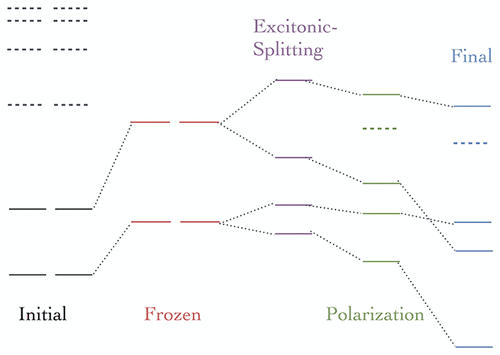当前位置:
X-MOL 学术
›
J. Chem. Theory Comput.
›
论文详情
Our official English website, www.x-mol.net, welcomes your
feedback! (Note: you will need to create a separate account there.)
Energy Decomposition Analysis for Excimers Using Absolutely Localized Molecular Orbitals within Time-Dependent Density Functional Theory and Configuration Interaction with Single Excitations
Journal of Chemical Theory and Computation ( IF 5.7 ) Pub Date : 2018-09-04 00:00:00 , DOI: 10.1021/acs.jctc.8b00537 Qinghui Ge 1, 2 , Martin Head-Gordon 1, 2
Journal of Chemical Theory and Computation ( IF 5.7 ) Pub Date : 2018-09-04 00:00:00 , DOI: 10.1021/acs.jctc.8b00537 Qinghui Ge 1, 2 , Martin Head-Gordon 1, 2
Affiliation

|
We present an improved energy decomposition analysis (EDA) scheme for understanding intermolecular interactions in delocalized excited states, especially in excimers. In the EDA procedure, excited states are treated with linear response theory such as configuration interaction singles (CIS) or time-dependent density functional theory (TDDFT), and absolutely localized molecular orbitals (ALMOs) are used to define the intermediate (frozen, excitonic coupling, and polarized) states. The intermolecular interaction energy is thereby separated into frozen, excitonic splitting, polarization, and charge transfer contributions. The excitonic splitting term describes the delocalization effect as two or more degenerate local excitations coupled with each other, which is often an important binding force in excimers. A maximum overlap state-tracking procedure is introduced to connect the initial fragment excitations to the constrained intermediate states and finally to the unconstrained delocalized states of the complex. The EDA scheme is applied to several excimer systems, including the He2* and Ne2* noble gas excimers, the doubly hydrogen-bonded 2-pyridone dimer, and the aromatic benzene and perylene excimers. We are able to gain some useful insights into the role each term is playing in the formation of these excimers, and the resulting method may also be useful for understanding a range of other complexes in excited states.
中文翻译:

准分子的能量分解分析,其使用时间依赖的密度泛函理论中的绝对局限性分子轨道和具有单个激发的构型相互作用
我们提出了一种改进的能量分解分析(EDA)方案,用于了解离域激发态(尤其是受激准分子)中的分子间相互作用。在EDA程序中,使用线性响应理论(例如构型相互作用单峰(CIS)或时间依赖的密度泛函理论(TDDFT))处理激发态,并使用绝对局部分子轨道(ALMO)定义中间体(冻结,激子)。耦合和极化)状态。分子间相互作用能因此被分为冻结的,激子分裂,极化和电荷转移贡献。激子分裂术语将离域效应描述为两个或多个彼此耦合的简并局部激发,这通常是受激准分子的重要结合力。引入了最大重叠状态跟踪程序,以将初始片段激发连接到受约束的中间状态,最后连接到复合物的不受约束的离域状态。EDA方案适用于多种准分子系统,包括He2 *和Ne 2 *稀有气体准分子,双氢键合的2-吡啶酮二聚体以及芳族苯和per准分子。我们能够获得一些有用的见解,以了解每个术语在这些受激准分子的形成中所起的作用,并且所得的方法也可能有助于理解激发态下的一系列其他络合物。
更新日期:2018-09-04
中文翻译:

准分子的能量分解分析,其使用时间依赖的密度泛函理论中的绝对局限性分子轨道和具有单个激发的构型相互作用
我们提出了一种改进的能量分解分析(EDA)方案,用于了解离域激发态(尤其是受激准分子)中的分子间相互作用。在EDA程序中,使用线性响应理论(例如构型相互作用单峰(CIS)或时间依赖的密度泛函理论(TDDFT))处理激发态,并使用绝对局部分子轨道(ALMO)定义中间体(冻结,激子)。耦合和极化)状态。分子间相互作用能因此被分为冻结的,激子分裂,极化和电荷转移贡献。激子分裂术语将离域效应描述为两个或多个彼此耦合的简并局部激发,这通常是受激准分子的重要结合力。引入了最大重叠状态跟踪程序,以将初始片段激发连接到受约束的中间状态,最后连接到复合物的不受约束的离域状态。EDA方案适用于多种准分子系统,包括He2 *和Ne 2 *稀有气体准分子,双氢键合的2-吡啶酮二聚体以及芳族苯和per准分子。我们能够获得一些有用的见解,以了解每个术语在这些受激准分子的形成中所起的作用,并且所得的方法也可能有助于理解激发态下的一系列其他络合物。











































 京公网安备 11010802027423号
京公网安备 11010802027423号